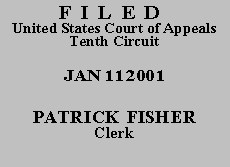

| JERRY L. GRIST,
Petitioner-Appellant, v. U.S. PAROLE COMMISSION, Respondent-Appellee. |
|
In this habeas action brought pursuant to 28 U.S.C. § 2241, petitioner appeals the district court's denial of relief. Petitioner was convicted of federal crimes in the Eastern District of Oklahoma and was sentenced to imprisonment for ten years. After serving five years, he was released on parole. While on parole, he was charged with another federal crime and arrested. Petitioner was detained on the second criminal charges, and on the day of that detention hearing, the Parole Commission issued a parole violator warrant. Petitioner argues on appeal that the parole violator warrant was not lodged as a detainer, but was, instead, executed. As a result, he claims that his constitutional rights were violated because he did not receive a hearing and that, because the warrant was executed, the full term of his first sentence (ten years) has expired and the detainer should be discharged.
The district court adopted the report and recommendation of the magistrate judge and concluded that the parole violator warrant had not been executed, but had been lodged as a detainer. Consequently, it held that petitioner's due process rights were not violated, because they were not triggered. It also held that petitioner's first sentence had not been served, because the issuance of the warrant tolled the running of the first sentence.
On appeal, we review the district court's findings of fact for clear error and its legal conclusions de novo. Smith v. United States, 82 F.3d 964, 965 (10th Cir. 1996). Guided by these standards, we agree that petitioner is not entitled to habeas relief. For substantially the same reasons stated in the district court's June 28, 2000 order and the magistrate's report and recommendation that it adopts, we AFFIRM the district court's denial of the habeas petition.(1) The motion for leave to proceed without prepayment of costs or fees is granted, as is the motion to supplement the record. The mandate shall issue forthwith.
Entered for the Court
Circuit Judge
*. This order and judgment is not binding precedent, except under the doctrines of law of the case, res judicata, and collateral estoppel. The court generally disfavors the citation of orders and judgments; nevertheless, an order and judgment may be cited under the terms and conditions of 10th Cir. R. 36.3.
1. Before the district court, petitioner argued that the Parole Commission lacked the authority to issue the warrant as a detainer before he was actually convicted of the second charge. He did not present that argument on appeal. We note, however, that in addition to the magistrate judge's analysis on that issue, the district court could also have based its rejection of that argument on 28 C.F.R. § 2.44(b), which specifically authorizes issuing a warrant and placing a detainer while a parolee is awaiting disposition of a criminal offense charge.